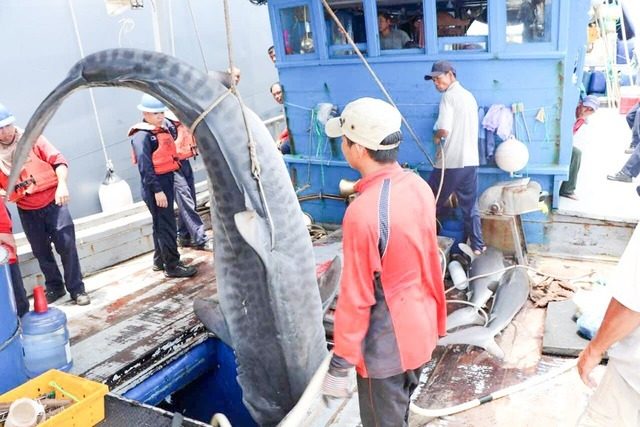SUMMARY
This is AI generated summarization, which may have errors. For context, always refer to the full article.

PUERTO PRINCESA CITY, Philippines – A coalition of non-governmental organizations and individuals working to protect marine species in the Philippines has urged the government to punish the Vietnamese poachers for the slaughter of around 70 sharks off Palawan.
Save Sharks Network Philippines – led by Marine Wildlife Watch of the Philippines (MWWP), Greenpeace, and Save Philippine Seas (SPS) – called on the government to ensure that justice would be served.
“We urge the government to take swift legal action against them, to send a strong message that we will not let the rape of our Philippine seas continue,” SPS Executive Director Anna Oposa told Rappler.
On August 8, the Philippine Navy nabbed 10 Vietnamese nationals aboard a fishing vessel with their illegal haul near the Malampaya platform. Two days later, poaching charges were filed against them.
The SSNP wants the government to seriously implement the law, instead of letting foreign poachers fly back to their country as what had happened in the past.
In December 2016, the Court of Appeals (CA) acquitted and deported 12 Chinese fishermen who were convicted for entering the Tubbataha Reef Natural Park in April 2013. (READ: CA acquits 12 Chinese fishermen of poaching at Tubbataha Reef)
The CA reversed the decision of the Puerto Princesa Regional Trial Court “for failure of the prosecution to prove their guilt beyond reasonable doubt.” It further argued that the foreigner fishermen were convicted despite “weak evidence of the prosecution.”
Strengthen enforcement
“The continued encroaching of foreign fishing vessels with the intent of poaching in the Philippines underscores the need to strengthen our patrolling capacity,” said Vince Cinches, Oceans Campaigner for Greenpeace Southeast Asia.
“What is more alarming is that this happened in the province considered as the country’s last ecological frontier where extra protection measures are in place,” he added.
Cinches said the destruction and plunder of Palawan’s marine resources could be stopped if the Philippines can “come up with clear measures with countries that frequently violated our laws…to develop agreements how to mutually deter this kind of activities.”
“We hope that the Philippine government will use the full extent and weight of the law against the perpetrators. As we all know, poaching, violation of territorial boundaries, and weak enforcement capacity are among the many factors why we are fast losing our resources,” Cinches told Rappler.
No species ID yet
Palawan environmental authorities are still identifying the species of the slaughtered sharks which had been brought to El Nido town along with the fishing vessel, other fishes, and fishing paraphernalia, for proper disposition.
After checking the photo of the shark haul released to the media, MWWP Executive Director AA Yaptinchay identified the big one as a tiger shark (Galeocerdo cuvier).
The tiger shark, categorized as “near threatened,” is a large omnivorous shark common worldwide in tropical and warm-temperate coastal waters, according to the IUCN Red List of Threatened Species website.
There are at least 60 species of sharks in the Philippines, according to a MWWP manual on sharks and rays. Scientific studies show there are nearly 500 species of sharks around the world.
Yaptinchay said he needs photos depicting a “clear view of fins and head, perpendicular to the body” to identify the species of the smaller sharks.
Overexploitation
Like any other marine species, sharks suffer from different threats, such as critical habitat loss, climate change, and overexploitation, said shark expert Debra Abercrombie, a marine biologist from Stony Brook University.
“[Their] populations recover slowly once they become depleted,” Abercrombie said in a shark and ray identification training here in February.
She said sharks are illegally traded for their meat and fins which contain ceratotrichia or “fin needles,” key ingredients in shark’s fin soup, an Asian delicacy commonly served in Hong Kong, Vietnam, and mainland China.
Other shark products in trade are jaws, liver oil, dried salted meat, skin, and cartilage.
Generally, sharks are protected under several local policies and national laws and international treaties, specifically the Convention on International Trade in Endangered Species of Wild Fauna and Flora (CITES).
In Palawan, elasmobranch or cartilaginous fishes like sharks are in the list of threatened marine wildlife in the province. The list is prepared by the Palawan Council for Sustainable Development, an environmental body mandated to implement the Republic Act 9147 or the Philippine Wildlife Act. – Rappler.com
Add a comment
How does this make you feel?
There are no comments yet. Add your comment to start the conversation.